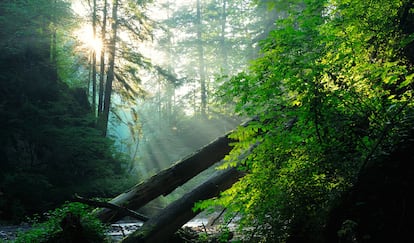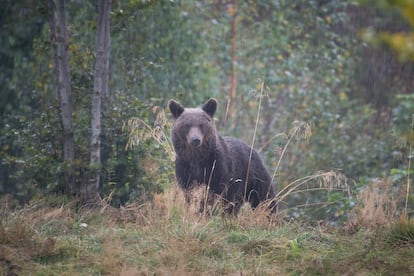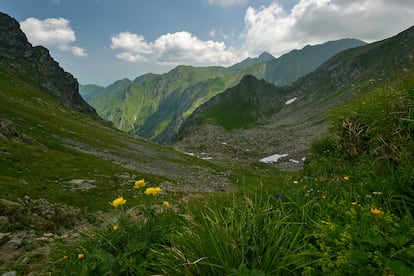Philanthropist group buys up large tracts of land in Romania to create ‘European Yellowstone’
Local residents who at first suspected gold or uranium deposits had been found are being won over by the initiative to protect nature and economically develop the areas involved


“It has to be an ambitious conservation project,” Hansjörg Wyss, one of the world’s leading environmental philanthropists, told Christoph and Barbara Promberger, promoters of the Foundation Conservation Carpathia, as a condition for financing the purchase of land in Romania, a country that today contains 65% of Europe’s virgin forests. The aim is to create “the European Yellowstone,” as the largest donor of the initiative described it after flying over the enormous expanse of the Fagaras Mountains, located in the extreme south of the Carpathian range, in a helicopter. So far, the foundation has already bought up 27,027 hectares in this still wild region, but the goal is to create a gigantic protected area of 200,000 hectares, an area roughly equivalent to the North Cascades National Park in Washington.
This area of Transylvania is home to one of the most important wildlife ecosystems in Europe. Wolves and brown bears — of the latter there are more than 5,000 in the country — lynx and beavers roam freely on the forested slopes of the Fagaras Mountains, the highest in the southern Carpathians. Several years ago, 80 bison were reintroduced two centuries after their disappearance from these territories, through a program run by the Foundation Conservation Carpathia. It all started in the mid-2000s when the Prombergers noticed the illegal logging that was still taking place in the Romanian forests, spurred by the restitution of woodlands to former owners from the pre-communist era. Illegal deforestation even spilled over into state-protected parks, such as Piatra Craiului — meaning The King’s Rock — one of the most popular in the country due to its immense variety of flora and fauna.

“‘Only if someone buys these forests and places them in private hands can we save them, at least until the state realizes the importance of preserving them,’ the director of a national park jokingly let slip,” says Barbara Promberger. At that point, the Austrian biologist and her husband Cristoph, a German forester, set out to find philanthropists and conservationists to raise funds to buy large tracts of forest to halt deforestation and, at the same time, promote ecotourism in support of local communities. “This national park has to serve to protect nature, but also to economically develop the areas involved,” says Barbara, who has lived in a tiny village in Brasov province for 30 years. As a conservation model, they were inspired by the Tompkins project launched in the 1990s to restore habitats in southern Chile and Argentina, and also by the Bavarian Forest National Park.
The 27,027 hectares they have acquired to date have been included in Romania’s National Catalog of Virgin and Quasi-Virgin Forests to protect them in perpetuity. The foundation has also reforested almost 2,000 hectares and replanted more than four million young trees such as beech, spruce and maple. Today, Romania has more than six million hectares of forest, a significant proportion of which is free of human settlement. But illegal logging has already wreaked havoc on vast tracts. For this reason, the organization’s rangers are patrolling some 75,000 hectares to stop illegal logging in neighboring forests as well. The project aims to involve the inhabitants of the small villages, located in the foothills of the Fagaras Mountains, by providing jobs and gradually attracting more visitors to the area, as well as developing educational and social programs.
However, the creation of the Fagaras National Park requires the agreement of the affected local authorities. This is where the Foundation Conservation Carpathia is encountering difficulties. “We are in a post-communist country, so people are wary of losing their property again to the state,” explains Barbara, who stresses that the fact that national parks have been set up without infrastructure has led to locals “being left with access restrictions and no economic benefits, which has increased the general rejection. We can only buy from private property, but not from municipalities or landowners’ associations, so our strategy is to acquire what we can and donate it to the state only if it creates a national park,” says the biologist.

The perception of the villagers in the 28 local communities has changed a lot over the years, but it is still the main challenge to overcome. At first, residents prejudged the foundation members as outsiders who wanted to earn significant income at the expense of their land. “They suspected that we had found gold or uranium; they couldn’t imagine that we would invest so much money to preserve nature alone,” says Barbara, who expects her residents to submit a formal request to the Romanian government in the next five to 10 years to turn their area into one of Europe’s largest nature reserves.
On the other hand, there are still localities that are resisting. “We believe it is due to the logging lobbies. Since they have been threatened, these groups that illegally cut the forests have started to create fake news about us, such as that we are going to throw snakes from an airplane, close access to the forests, or cut down the trees,” says Victoria Donos, the foundation’s director of communication and local community relations. “They don’t understand that there really is someone who wants to do good without any interest in return,” adds the activist, who specifies that it will be a park without restrictions with a protected area and another for economic development.

As another innovative measure, the foundation created its own hunters’ association and acquired the hunting rights to 80,000 hectares to protect wildlife, as poaching was especially damaging the herds of chamois and deer. “There is significant opposition from hunters; they perceive us as a danger because we support a quota established under scientific reason to avoid endangering wildlife and the existence of a species,” Donos says.
On the outskirts of the commune of Leresti, which has about 4,500 inhabitants, 28 bison were reintroduced two years ago, which will soon lead to the opening of a bison observation center to attract tourists and further revitalize the area. “Over time, the inhabitants have understood what Carpathia wants to do,” says Marian Toader, mayor of Leresti, who says the area has become a tourist resort of local interest in just a few months. The foundation already owns 3,200 of the commune’s 15,000 hectares, says the mayor, who has seen how the outlying villages of the Bavarian Forest National Park have benefited. “In addition, it has helped us to keep bears away from residents’ houses, a problem that used to occur on a daily basis, by building electric fences,” concludes Toader.
Sign up for our weekly newsletter to get more English-language news coverage from EL PAÍS USA Edition
Tu suscripción se está usando en otro dispositivo
¿Quieres añadir otro usuario a tu suscripción?
Si continúas leyendo en este dispositivo, no se podrá leer en el otro.
FlechaTu suscripción se está usando en otro dispositivo y solo puedes acceder a EL PAÍS desde un dispositivo a la vez.
Si quieres compartir tu cuenta, cambia tu suscripción a la modalidad Premium, así podrás añadir otro usuario. Cada uno accederá con su propia cuenta de email, lo que os permitirá personalizar vuestra experiencia en EL PAÍS.
¿Tienes una suscripción de empresa? Accede aquí para contratar más cuentas.
En el caso de no saber quién está usando tu cuenta, te recomendamos cambiar tu contraseña aquí.
Si decides continuar compartiendo tu cuenta, este mensaje se mostrará en tu dispositivo y en el de la otra persona que está usando tu cuenta de forma indefinida, afectando a tu experiencia de lectura. Puedes consultar aquí los términos y condiciones de la suscripción digital.








































